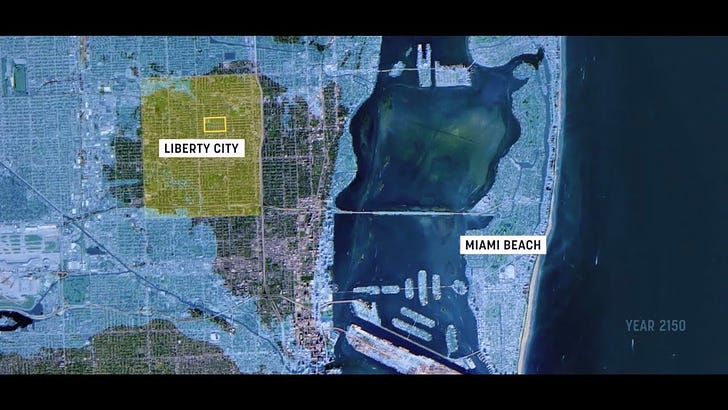“Universal basic income is not a solution in search of a problem - it is the obvious solution that has been in front of us for years. It only requires us to have the vision, empathy and courage to adopt it for the American people before it is too late.”
Andrew Yang
“Vision, empathy and courage” are three hefty words when applied to our government, and perhaps their implementation involves more heavy lifting than our elected officials are willing to do. But their meaning embraces what values our government should have, and should use, to create programs to help its people thrive. If our country can summon a vision of our collective long-term future, demonstrate empathy in our reason for governing, and have the courage to stake out policies that shift the political winds rather than follow them, we might be able to finally unite to embrace programs for the common good.
But it is crucial to understand the message and the way the message is framed. I noticed that my esteemed fellow Substack writer and former Secretary of Labor in the Clinton administration, Robert Reich, made a critical point in one of his posts that described how issues can be “framed” for us by the media. He mentioned his recent interview on CNN where he and a former Republican Governor were discussing the negotiations on the infrastructure and reconciliation plans. Reich pointed to the anchor’s first question as an example of framing the discussion in the direction the media wants the commentators and audience to be led: Her opening question was, “The big question is whether Democrats can afford all of this.”
As Reich noted, this opening query immediately framed the issue in terms of cost, and then made it a partisan issue by associating the democrats with the cost of the proposed legislation.
Similarly, most of the information I’ve read discussing both the idea and practical implementation of a Universal Basic Income uses as a justification for the plan the idea that technology and the use of mathematical algorithms will soon replace hundreds of thousands of human workers, and they’re going to need some (perhaps temporary) financial support. I think this “framing” of the need for a Universal Basic Income is way too narrow.
Don’t we all want to have that freedom to dream for a better life, not just for our children and grandchildren, but for us?
First, it is possible that we don’t need to point to a specific rationale to expand our country’s social safety net in that way, although offering logical reasons for spending taxpayer money doesn’t hurt. Even Andrew Yang, who made UBI a cornerstone of his presidential and New York mayoral campaigns used the robot and automation warnings as at least one reason to push for what he dubbed a “Freedom Dividend”. As Yang stated: “…a nationwide Universal Basic Income program would be the largest, most fundamental shift in modern history, and one that would finally unlock the potential of the American people."
What I love about this characterization is the importance placed on “unlocking the potential of the American people.” It seems that most elected officials, who perhaps have never had to scrape by to support themselves, to pay basic bills, to eat, don’t understand that even a small, additional monthly check can be freeing—lifting the burden of worry and shame from the backs of those struggling, so they might have a bit of energy left at the end of the day to perhaps dream, and then actually plan to turn those dreams into their future reality. Don’t we all want to have that freedom to dream for a better life, not just for our children and grandchildren, but for us? That’s what a UBI would do for millions of Americans—it would indeed be a freedom dividend.
Alaska’s nearly 40 year UBI program, funded by money from the oil and gas industry and dispersed in yearly checks to every resident, has been widely hailed as successful. And no, it hasn’t created a slacker state: recent studies have found that it has not discouraged Alaska’s population from working. In fact, there has been a 17% increase in part-time employment in the state, and it has also cut poverty levels.
Even the rock star French economist, Thomas Piketty, uses the automation rationale to push for EDI, but in his published tomes that discuss this issue, he also puts the need for a minimum guaranteed income into a detailed global and historical perspective, and is only one of many sweeping changes he proposes to remedy inequality.
The truth is that a guaranteed basic income is only one way to ease the raging economic inequality in out country, but by many accounts, it is a fair and effective way, and has the ability to virtually wipe out poverty if implemented along with subsidized food and housing programs for the elderly and disabled and for those who otherwise can’t work a full-time job.
“Povery is not a lack of character, poverty is a lack of cash.”
Interestingly, this wildly popular TED talk by the Dutch historian, Rutger Bregman, is one of the few sources that proposes UBI, but does not also justify its need based on the idea that workers will lose their jobs to technology. Bregman has concluded, based on years of research, that a Universal Basic Income is simply the right thing to do. People are poor because of a lack of cash, not from a lack of intelligence or gumption, or even a “personality defect” as Margaret Thatcher once famously claimed. And the only solution that will help the poor is to give them cash in the form of a guaranteed income… and that is what will eliminate poverty. As Bregman emphasized, “Povery is not a lack of character, poverty is a lack of cash.”
Watch this fascinating talk here:
Maybe we can simply justify the need for UBI in our country because it is the right thing to do. As I mentioned in my first post, science has documented that communities of trees can exist, at least for awhile, as individual plantings, but will never thrive without a comprehensive system of support provided for all members of the community. In old-growth forests, this support system is an underground web of fungi providing nutrition and communication to even the weakest members of its community. Likewise, human communities can exist, but never thrive without a broad and deep support system that reaches everyone, including our most vulnerable.
I’d love to hear your thoughts. Should we have a UBI? If we do, can we come close to eliminating poverty?
Feel free to share this post to broaden the conversation.
And if you are not already on the free email list or would like to support my work with a paid subscription, feel free to sign up. Your comments and support are much appreciated.















Universal Basic Income